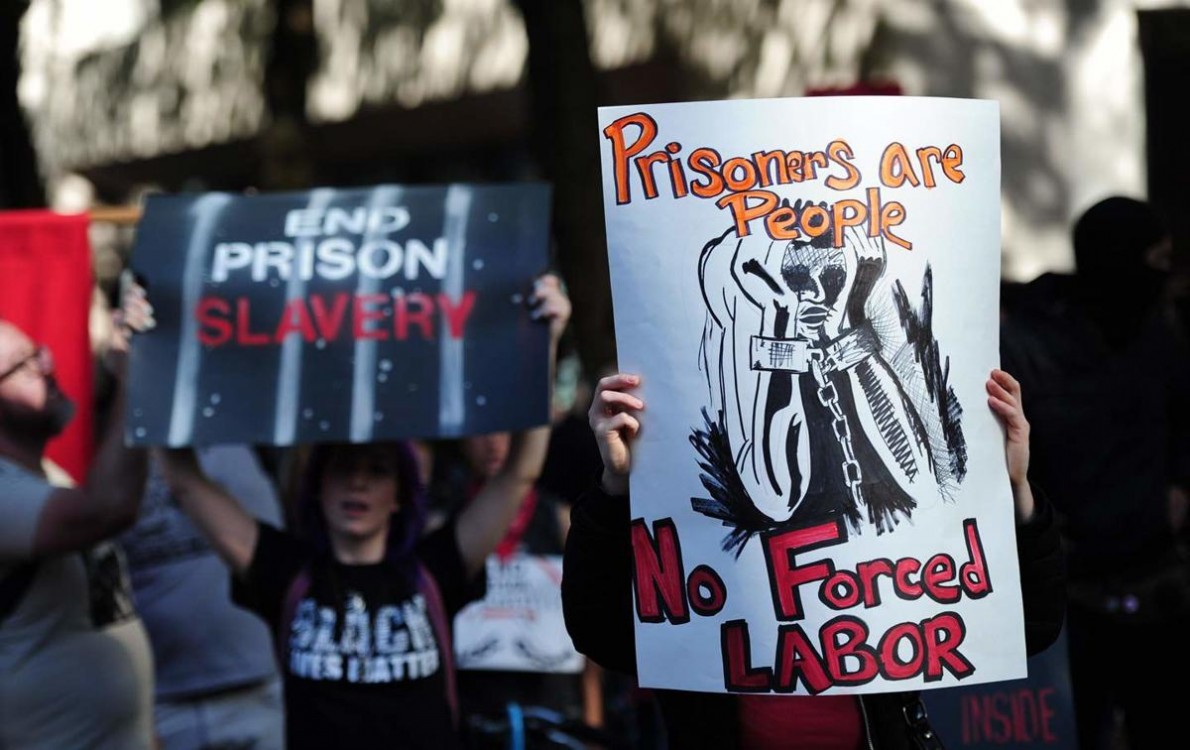
The current national prison strike will have wrapped up by Sept. 11, but in its spirit, instead of simply mourning the victims of terrorism in 2001 or the U.S.-supported coup in Chile in 1973, we might celebrate something else that happened on that date. On September 11, 1851, several escaped slaves stood in successful armed resistance against their former owner and his hired guns in Christiana, Pennsylvania.
The escapees – Noah Buley, Nelson Ford, George Ford, and Joshua Hammond – had left the land of their owner, wealthy Maryland farmer Edward Gorsuch, years earlier. They were safe in Pennsylvania on a farm owned by William Parker, a biracial abolitionist who advocated and participated in armed resistance in defense of escapees in the area. Having learned the four men were in nearby Lancaster County, Gorsuch organized several search parties and alerted U.S. Marshals who were charged with enforcing the recently enacted Fugitive Slave Act.
When Gorsuch and his people arrived in Christiana, they were met by armed townspeople, including abolitionists, free Africans, and other allies. Gorsuch was killed and his son wounded. The Marshals and slave-hunters retreated. Later, charges against several townspeople involved in the fighting were dropped, after the only person actually put on trial was acquitted.
The battle energized the abolitionist movement, and serves as a metaphor for the 2018 prison strike – also a battle against slavery. We need to build William Parker’s farm all over the country. We need to be willing to make our homes their homes, and to put our bodies on the line for them.
An end to indentured labor
Coordinated by prisoners nationwide and by outside organizations such as the Incarcerated Workers Organizing Committee and Jailhouse Lawyers Speak, and spanning at least 17 states, the 2018 prison action may be the largest in U.S. history. Prisoners’ demands include improved prison conditions, sentencing reform, rehabilitation and treatment services, and most importantly:
“An immediate end to prison slavery. All persons imprisoned in any place of detention under United States jurisdiction must be paid the prevailing wage in their state or territory for their labor.”
At the center of the strike’s resistance is rejection of the assertion that people can be indentured. Nearly a million prisoners across the country are forced to work without choice or with very little choice, sometimes paid as little as four cents an hour. So this actionincludes boycotting commissaries, engaging in hunger strikes, and refusing to work.
While past strikes haven’t always gained much attention, this action is yielding different results. In a historic step, the prisoners are being joined by immigrant detainees at U.S. Immigration and Customs Enforcement (ICE) detention centers, with at least 60 ICE detainees in Washington going on hunger strike in solidarity with prisoner demands. A group of ICE detainees recently alleged that forced labor happens in those facilities.
It’s tough to overstate the importance of the demand to be paid prevailing wages. Contrary to what we are often told, the prison labor system is not self-contained. The work incarcerated people do for next to nothing drives down wages for everyone else, and it’s not just maintaining prison facilities or making license plates (although the labor costs for such work are also connected to the rest of the labor market).
Dozens of companies, including Starbucks, Whole Foods, McDonald’s, and Walmart have been alleged over the years to use prison labor. (One site, which I have not verified, lists 50 such companies). Companies sometimes deny doing this, and they may take measures to distance themselves from the obvious parts of their relationship with the prison labor system.
That’s why the solution lies not so much in shaming exploitative companies as in guaranteeing, through the rule of law, that all prisoners be paid prevailing wages and have the right to refuse or change employment. If the laborers themselves are paid prevailing wages, we would no longer need to haggle with each individual company about the extent to which it profits from slave labor.
If they aren’t free, we aren’t free
A few days into the strike last month, I spoke with Ed Mead, a former federal prisoner and co-founder of the George Jackson Brigade, an armed revolutionary group active in Seattle during the 1970s. He now writes and edits materials for prisoners from legal education to promotion of prisoner art.
Mead reminded me that the widespread prisoner movements of the 1950s and later the 1970s reflected a comparatively large amount of solidarity and class consciousness, and resulted in court decisions that narrowly increased the range of prisoner rights. Many of those rights have since been whittled away, making the current actions in and around prisons more important than ever.
I asked Mead my standard question about prison movements: Why do even progressive people so often fail to stand in solidarity with prisoners? Why do some people’s empathy machines turn off when the subject of incarceration comes up?
Instead of an answer grounded in psychology or ethics, Mead turned to economics. “When I was released from the federal prison in Sheridan Oregon,” he said, “I was not given a penny. I was given a plane ticket to another state. Most prisoners when released are given something in the neighborhood of 40 dollars. That’s not even enough for a hotel room. So you say they had the choice of not committing a crime? What kind of choice is that?”
It was a simple answer to a question I had overthought, and it provides still another reason why the demand for just wages for the incarcerated is central to prisoner emancipation. Injustice is inevitable and unsolvable when we can be forced to spend our life-force for others’ private profit, or for a state that has disenfranchised us.
Literal slavery inside of prisons (and immigration detention centers), oppressive wage and consignment work outside of prisons, racism, and material hierarchy form a tangled web around all of us. The only viable way out of that web is a position of unconditional solidarity with the least powerful humans in the system.
Matt Stannard is the Director of Solidarity House, a policy research and media cooperative. He has worked with Commonomics USA, the Public Banking Institute, and Farm Commons. He writes and podcasts on cooperative economics, law, and farming.

















